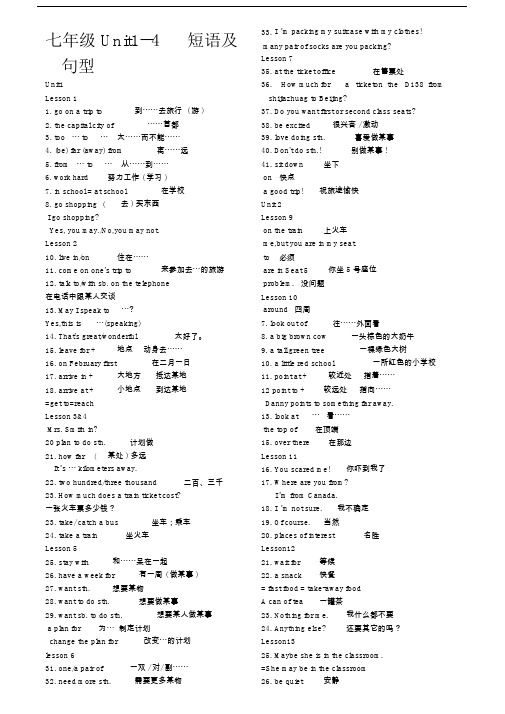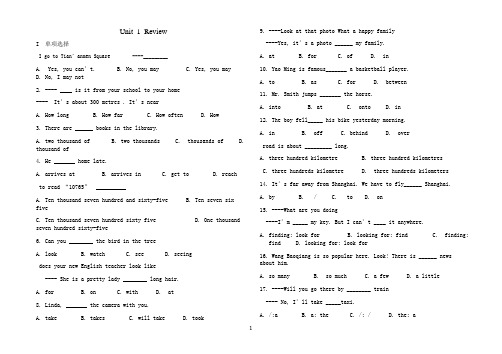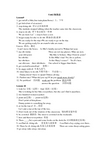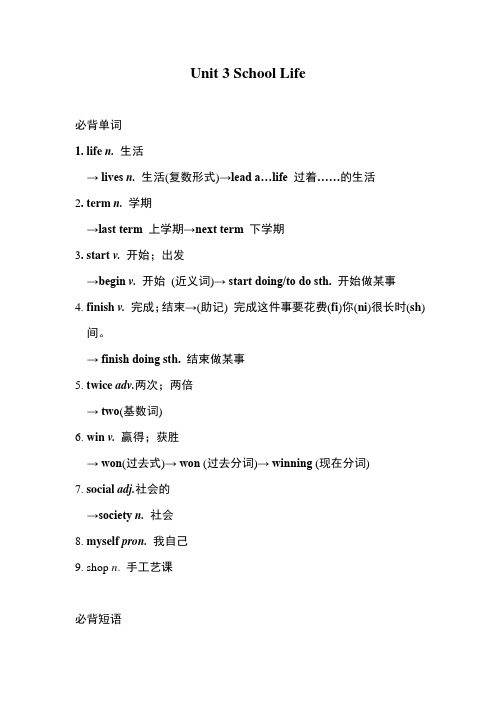冀教版七年级英语下学期复习资料
★新冀教版七年级的英语下18单元知识点总结.doc

七年级 Unit1--4 短语及33. I ’m packing my suitcase with my clothes!many pair of socks are you packing?句型Lesson 735. at the ticket office 在售票处Unit1 36. How much for a ticketon the D138 from Lesson 1 shijiazhuag to Beijing?1. go on a trip to 到⋯⋯去旅行 ( 游 ) 37. Do you want first or second class seats?2. the capital city of ⋯⋯首都38. be excited 很兴奋 / 激动3. too ⋯ to ⋯太⋯⋯而不能⋯⋯39. love doing sth. 喜爱做某事4. (be) far (away) from 离⋯⋯远40. Don't do sth.! 别做某事 !5. from ⋯ to ⋯从⋯⋯到⋯⋯41. sit down 坐下6. work hard 努力工作 ( 学习 ) on 快点7. in school = at school 在学校 a good trip! 祝旅途愉快8. go shopping ( 去 ) 买东西Unit 2I go shopping? Lesson 9Yes, you may./No,you may not. on the train 上火车Lesson 2 me,but you are in my seat.10. live in/on 住在⋯⋯to 必须11. come on one's trip to 来参加去⋯的旅游are in Seat 5 你坐 5 号座位12. talk to/with sb. on the telephone problem. 没问题在电话中跟某人交谈Lesson 1013. May I speak to ⋯? around 四周Yes,this is ⋯(speaking) 7. look out of 往⋯⋯外面看14. That's great/wonderful. 太好了。
新版冀教版英语七年级下单元复习unit-1

Unit 1 ReviewI 单项选择I go to Tian’anmen Square ----_________A. Yes, you can’t.B. No, you mayC. Yes, you mayD. No, I may not2. ---- ____ is it from your school to your home---- It’s about 300 metres . It’s nearA. How longB. How farC. How oftenD. How3. There are ______ books in the library.A. two thousand ofB. two thousandsC. thousands ofD. thousand of4. He _______ home late.A. arrives atB. arrives inC. get toD. reachto read “10765” __________A. Ten thousand seven hundred and sixty-fiveB. Ten seven sixfiveC. Ten thousand seven hundred sixty fiveD. One thousand seven hundred sixty-five6. Can you ________ the bird in the treeA. lookB. watchC. seeD. seeingdoes your new English teacher look like---- She is a pretty lady ________ long hair.A. forB. onC. withD. at8. Linda, _______ the camera with you.A. takeB. takesC. will takeD. took 9. ----Look at that photo What a happy family----Yes, it’s a photo ______ my family.A. atB. forC. ofD. in10. Yao Ming is famous_______ a basketball player.A. toB. asC. forD. between11. Mr. Smith jumps _______ the horse.A. intoB. atC. ontoD. in12. The boy fell_____ his bike yesterday morning.A. inB. offC. behindD. overroad is about _________ long.A. three hundred kilometreB. three hundred kilometresC. three hundreds kilometreD. three hundreds kilometers14. It’s far away from Shanghai. We have to fly______ Shanghai.A. byB. /C. toD. on15. ----What are you doing----I’m _____ my key. But I can’t ____ it anywhere.A.finding; look forB. looking for; findC. finding;find D. looking for; look for16. Wang Baoqiang is so popular here. Look! There is ______ news about him.A. so manyB. so muchC. a fewD. a little17. ----Will you go there by ________ train---- No, I’ll take _____taxi.A. /;aB. a; theC. /; /D. the; a18. The train goes ______ Beijing ____ Shanghai.A. from; andB. to; toC. from; toD. in; and’s go shopping tomorrow! ----________.A. All rightB. RightC. That’s all rightD. You’re right20. I want to sit on one of the ________!A. houseB. horseC. horsesD. housesII 完形填空Riding a bicycle is 1 cheap(便宜的) way to travel. The first bike was made about 150 years ago. At first, bikes were expensive. Only rich people could buy ___2__. The __3__ bikes looked different from the ones we have today. Later, __4___ bicycles were cheaper, __5__ people could buy them and began to ride bikes to work and in __6__ free time.Today, people use cars more than bikes. Cars are much ___7__ and we don’t get __8___ when it rains! But some people __9__ like to cycle to work. They say that __10__ are too many cars in the town centers and they can’t find anywhere to park( 停车).21. A. the B. an C. a22. A. they B. its C. them23. A. same B. late C. early24. A. when B. if C. that25. A. much B. many C. a little26. A. their B. his C. its27. A. fast B. faster C. fastest28. A. cold B. wet C. warm29. A. still B. also C. often 30. A. they B. there C. here III. 阅读 ABSunday : We shop in Wangfujing Street .Monday : We leave Beijing for Baoding.Tuesday : We go to Baiyangdian.Wednesday : We go to the zoo.Thursday : We go shopping.Friday : We leave Baoding and go to Shijiazhang.根据上面的内容回答问题。
七年级下册冀教版英语第一课知识点

七年级下册冀教版英语第一课知识点全文共四篇示例,供读者参考第一篇示例:第一课《Welcome to Sunshine Town》是七年级下册冀教版英语的开篇课程,通过本课的学习,学生将了解一个虚构的阳光镇,并学习如何用英语介绍一个地方。
本文将为大家详细介绍这一课程的知识点。
让我们来看一看本课的重点词汇。
在《Welcome to Sunshine Town》中,我们需要掌握一些地点名称的英文表达,比如park(公园)、library(图书馆)、hospital(医院)等。
我们还会学习一些形容词,如beautiful(美丽的)、quiet(安静的)、busy(忙碌的)等,用来描绘地方的特点。
学生还需要掌握一些日常用语,如Welcome to Sunshine Town!(欢迎来到阳光镇!)、Where is the park?(公园在哪里?)等。
本课还要求学生能够运用所学知识进行口语交流。
学生需要根据图片和教材中提供的信息,自由描述阳光镇的景观和设施,并能够用简单的英语进行问答。
这样的练习对于提高学生的口语表达能力非常有效,也能够培养他们的逻辑思维能力。
本课还要求学生进行一些实践操作。
学生可以根据学到的知识,自己设计一个虚构的小镇,包括地图、景点介绍、交通方式等,并用英语来进行介绍。
这样的实践操作不仅可以让学生将所学知识运用到实际生活中,还能够锻炼他们的创造力和表达能力。
《Welcome to Sunshine Town》这一课程是七年级下册冀教版英语的一个重要环节,通过学习这一课程,学生不仅可以掌握一些基础的英语词汇和语法知识,还能够提高自己的口语表达能力和逻辑思维能力。
希望学生们能够在学习中努力进步,掌握好这门课程的知识点,为接下来的学习打下良好的基础。
【长度: 432 字】第二篇示例:七年级下册冀教版英语第一课主要介绍了一些关于学校和学习的词汇和句子,让学生在初中阶段可以更好地了解学校生活和学习内容。
最新冀教版七年级下英语总复习

打造高效课堂心得体会本学期学校教导处组织我们学习了《如何才能打造高效课堂》。
经过学习,我认识到了高校课堂的重要性,也懂得了什么样的课堂才是高效课堂,同时对如何打造自己的高效课堂有了些许的认识和体会。
课堂教学是学校教育的主阵地。
追求课堂教学的高效率,是每一个老师不断追求的目标,它是教学过程的最优化,教育效果的最大化,是师生完美配合的结晶。
高效课堂是针对课堂教学的无效性、低效性而言的。
现在新课程改革如火如荼,“自主、合作、探究”为核心的课堂教学备受青睐。
课堂教学高效性是指在常态的课堂教学中,通过教师的引领和学生积极主动的学习思维过程,是在训练习作中的升华认识,在一节课的时间里高效率、高质量地完成教学任务、促进学生获得高效发展。
具体表现在:学生在认知上,从不懂到懂,从少知到多知,从不会到会;在情感上,从不喜欢到喜欢,从不热爱到热爱,从不感兴趣到感兴趣。
高效课堂的前提是看学生是否愿意学、会不会学,乐不乐学,核心是教学三维目标的达成。
因此,评价课堂是否高效主要是看能否高效地促进学生的发展、高效地实现预期教学目的。
如何实施高效课堂教学策略呢?我觉得具体的是:一、精心备好课,是打造高效课堂的前提。
精心备课,分四步。
第一步是在备课前泛读,我们一定要经过大量的阅读和准备,不单是写写教案那么简单,自己必须广泛深入地阅读,随时充电充实自己,打下深厚的知识基础,作好充足的教学准备。
比如科学课中有许多知识和技能必须老师先弄得清清楚楚,明明白白才能给学生去上课,否则你不可能让学生透彻地掌握正确的科学知识与技能;自己如果都是迷迷糊糊的,那学生肯定更是云里雾里的。
这哪谈得上高效呢?只会令学生生厌而已,久而久之就是误人子弟了。
所以,我每次备课前都进行大量的阅读。
翻阅各种资料,上网查询各种疑难问题。
所以,本期我自己阅读学习的教学资料形成了厚厚的一本,远远超过了备课本的厚度。
“台上一分钟,台下十年功”,这句话我是深有体会了。
总之,我认为一个负责任的老师绝不能把自己都不懂的东西去教学生。
冀教版英语七年级下册第二单元知识点总结

Unit2知识点Lesson91. get on/off a (bike,bus train,plane/horse) 上,下车2. get in(to)/out of a(car,taxi)3. stop doing sth. 停止正在做的事The students stopped talking when the teacher came into the classroom.4. stop to do sth. 停下来去做另一件事We are tired. Let’s stop to have a rest.5. be/get ready for sth./ to do sth 准备好(做)某事We are ready for the trip.=We are ready to go on the trip.We are getting ready for an exam/to take an exam..6.move 移动,搬迁I can’t move the boxes. Li Mei’s family moved to Wuhan last year.7. my sth =mine These are not my glasses. Mine are new.your sth=yours My bike is broken.. May I borrow yours?his sth=his Is this Mike’s hat? No, his is yellow.her sth=hers Is this Mary’s eraser? Yes.It’s hers.our sth=ours their sth=theirs Our school is bigger than theirs.8. get excited/worried/sad 变得…9. be angry with sb 生某人的气10. (don’t)have to do sth.不得不做…不必做…;Danny doesn’t have to speak Chinese all day.11. Pardon (me)? What did you say?/Can you speak more slowly?12. No problem! 没问题work out the problem 解决问题answer the question 回答问题Lesson 101. look for寻找(过程)find 找到(结果)She is looking for her bike everywhere, but she can’t find it anywhere.2. two hundred women teachers3. point at(近指) ;point to(远指)Don’t point at him,please.Danny points to something far away.4. at /on the top of 在…顶部Let’s put a star at the top of the tree.5. Don’t look out of the window of the classroom. 别向教室窗外看6. be crowded 拥挤的The street is crowded on the weekends.7. here and there=everywhere 到处8. There ____(be) a pen and some books on the desk.(be动词根据就近原则)9. see/find sb. doing sth. 看见某人做某事I see/find a boy crying over there..10. There be sb. doing sth.有某人在做某事There are some sheep eating grass.11.go away ;take away; run away1.on the farm在农场live on the twelfth floor住在第12层楼2.suddenly(adv)突然(常用语句首或句末)Suddenly, I heard someone calling“help”突然,我听到有人喊救命3. listen t o…听(过程)hear 听见(结果)hear sb. doing sth.______(听)!Can you_____(听见)someone ________(唱) in the next room?4.voice (n) 嗓音Deng Lijun has a sweet voice.5.scare(v) 惊吓---(adj)scared 害怕的You scared me. 你吓了我一跳Don’t be scared. 别害怕be scared of sb/sth 害怕…The girl is scared of dogs/doctors.be scared of doing/to do sth害怕做某事I’m scared of going out/to go out at night.6.Of course=Sure=Certainly 当然7.interesting places= places of interest 名胜古迹8.hope+将来是从句. I hope you will enjoy your trip .我希望你旅行愉快hope to do sth. I hope to see you soon.我希望很快见到你I hope so. .希望如此I hope not.希望别那样9.enjoy doing sth.=have fun doing sth. 喜欢做某事Children enjoy watching TV.10. I’m not sure. 我不确定11.a lot of=lots of 修饰可数名词复数或不可数名词Lesson 121.wait for sb./sth.to do sth.“等待某人/某物干某事”;服务员waiter(男) waitress(女) We’re waiting for the bus to come.2.finally=at last=in the end “最后,终于”3.something to eat/drink “吃的/喝的东西”4.one’s own sth.“某人自己的东西”This is my own computer5.Anything else= What else would you like? 你还要点别的吗?else后置修饰不定代词及特殊问词6.Please call me when you arrive.三个“到达”,只有arrive可单独使用,后不跟地点Lesson 131.“可能”Maybe(用于句首)=主语+may beMaybe Mr Smith is in the library.= Mr Smith may be in the library.2.quiet(adj)---(adv)quietly“安静的,安静地”Please be/keep quiet. 请安静/请保持安静They are reading newspapers quietly. 他们在静悄悄地看报。
冀教版七年级下册英语 Unit 3 ---4 单元知识点归纳

Unit 3 School Life必背单词1. life n.生活→ lives n. 生活(复数形式)→lead a…life 过着……的生活2. term n.学期→last term 上学期→next term 下学期3. start v. 开始;出发→begin v. 开始(近义词)→ start doing/to do sth. 开始做某事4. finish v. 完成;结束→(助记)完成这件事要花费(fi)你(ni)很长时(sh)间。
→ finish doing sth. 结束做某事5. twice adv.两次;两倍→ two(基数词)6. win v. 赢得;获胜→ won(过去式)→ won (过去分词)→ winning (现在分词)7. social adj.社会的→society n.社会8. myself pron.我自己9. shop n. 手工艺课必背短语10. sports meet 运动会11. twice a week/year 一周/年两次12. long/high jump 跳远/跳高13. be good at doing sth. 擅长做某事14. social studies 社会科学15. by oneself 独立地;单独16. take part in 参加必背句子17. How is your school life going?你的学校生活怎么样?18. We always have a big sports meet twice a year.我们总是一年举行两次大型运动会。
19. You're good at the long jump.你很擅长跳远。
20. Last week, I made a bird house all by myself.上周,我独立制作了一个鸟舍。
必背单词1. middle adj.中等的→ in the middle of 在……中间2. grade n.年级→Grade Seven 七年级3. print v. 印图案于;印刷→ printer n.印刷工人→ print out 印制出来4. guitar n. 吉他→play the guitar弹吉他5. fair n.展览会→adj.公平的,合理的6. wood n. 木头;木材必背短语7. on one's own 单独;独自8. work on 从事于……必背句子9. My friend, Danny, is in my class.我的朋友丹尼是我们班的。
冀教版七年级下册英语Unit 1 单元知识点归纳
Unit 1 A Trip to the Silk RoadLesson 1必背单词1. trip n. 旅行,旅程→ a trip to 一次……的旅行→ have /take a trip 旅行2. silk n. 丝;丝绸→ the Silk Road 丝绸之路3. road n. 路,公路4. lead v.带领;指路→led(过去式)→led(过去分词)→leader n. 领导者;领袖→lead to 引向;通向;导致5. note n. 便笺;笔记6. chance n. 机会;运气→ take a chance to do sth. 抓住机会做某事7. send v. 寄;送→sent(过去式)→sent(过去分词)→send sb. sth. 给某人寄某物8. news n. 新闻,消息必背短语9. guess what 猜猜看;你猜怎么着10. learn about 学习;了解必背句子11. We’re learning about the Silk Road this month in school.这个月在学校我们学习丝绸之路。
12. May I go with them? 我可以和他们一起去吗?13. Who will lead the trip? 这次旅行由谁带队?Lesson 2必背单词1. exciting adj. 使人激动的(用来修饰物)→ excited adj. 感到兴奋的(用来修饰人)2. along prep. 沿着……→ walk along 沿着……走3. kilometre n. 千米,公里4. special adj. 特殊的;特别的→specially adv. 特殊地;特别地5. culture n. 文化6. arrive v. 到达,抵达→ arrive in 到达(大地点) → arrive at 到达(小地点)7. leave v. 动身;出发;离开→ left (过去式)→ left (过去分词)→ leave for sp. 前往某地;动身去某地必背短语8. plan for the trip 关于旅行的计划9. come back to 回到……必背句子10. How exciting! 多么令人激动!11. How far is it from Beijing to Xi’an?从北京到西安有多远?12. But we don’t have enough time to see it all.但是我们没有足够的时间去看它的全貌。
冀教版七年级下册英语Unit 3 单元知识点归纳
Unit 3 School LifeLesson 13必背单词1. life n. 生活→ lead/live a ... life 过着……的生活2. term n. 学期→ last term 上学期→ next term 下学期3. start v. 开始;出发→ begin v. 开始(同义词)→ start doing/to do sth. 开始做某事4. finish v. 完成;结束→ finish doing sth. 结束做某事5. twice adv. 两次;两倍→ two(基数词)6. win v. 赢得;获胜→ won(过去式)→ won(过去分词)→ winning(现在分词)7. social adj. 社会的→ society n. 社会8. myself pron. 我自己必背短语9. sports meet 运动会10. twice a week/year 一周/ 年两次11. the long/high jump 跳远/ 跳高12. be good at doing sth. 擅长做某事13. social studies 社会科学14. by oneself 独立地;单独15. take part in 参加必背句子16. How is your school life going?你的学校生活怎么样?17. We always have a big sports meet twice a year.我们总是一年举办两次大型运动会。
18. You’re go od at the long jump.你擅长跳远。
19. Last week, I made a bird house all by myself.上周,我独立地做了一个鸟窝。
Lesson 14必背单词1. middle adj. 中等的2. grade n. 年级→ Grade Seven 七年级3. print v. 印图案于;印刷→ printer n. 印刷工人;打印机→ print out 印制出来4. guitar n. 吉他→ play the guitar 弹吉他5. fair n. 展览会必背短语6. on one’s own 单独;独自7. work on 从事于……必背句子8. My friend, Danny, is in my class.我的朋友丹尼在我的班里。
- 1、下载文档前请自行甄别文档内容的完整性,平台不提供额外的编辑、内容补充、找答案等附加服务。
- 2、"仅部分预览"的文档,不可在线预览部分如存在完整性等问题,可反馈申请退款(可完整预览的文档不适用该条件!)。
- 3、如文档侵犯您的权益,请联系客服反馈,我们会尽快为您处理(人工客服工作时间:9:00-18:30)。
【本讲教育信息】 一. 教学内容: 期末复习 二. 重点、难点: 1. forget n 忘记 (1)forget+n. 忘记某事。 Sorry, I forgot your name. 对不起,我忘记了你的名字。 (2)forget to do sth. 忘记去做某事。 I forgot to sweep the floor 我忘记扫地了。 (3)forget doing sth 忘记做过某事。 I forgot telling him. 我忘记已经告诉过他了。 2. pass传递 pass表“传递,传达”。作及物动词,后可接双宾语。 (1)pass sb. sth. =pass sth to sb. 把某物传给某人 Pass me the book, please pass the book to me. Please pass me a glass of tea. 请递给我一杯茶。 注意:当所递的物用it代替时,必须用pass it to sb的形式。如 Pass it to me, please.请把那个递给我。 3. make v制造. 使„„ (1)make a boat造船;make a road筑路 (2)make sb. do sth使某人做某事。如 The teacher made me do it again. 老师让我再做一遍。 (3)make+名词或代词+形容词。如; Make the world beautiful. 让世界变得更美丽。 Let’s make our country stronger. 让我们使我们的国家变得更强大。 4. What a cold snowy day! 今天多么冷,雪又多么大! 这是一个感叹句。感叹句表示说话时的惊异、喜悦、气愤等情绪,这类句子通常是用what或how引起的. what用来感叹一个名词,不管名词前有没有形容词修饰或者名词是可数名词还是不可数名词;how用来感叹形容词,副词或动词。如: What a fine day it is! 多好的天气啊! What good news it is! 多好的消息呀! How beautiful these flowers are! 这些花多漂亮啊! How fast they are working! 他们干得真快啊! 在使用感叹句的时候,将被感叹的部分提前置于what或how之后,句子其余的部分用正常语序,有时可以省略句子的主谓语。如: How beautiful! 真美! What a lovely day! 多好的天气! 5. 1ittle与a little;few与a few (1)few,a few后加可数名词的复数形式。few表示否定。几乎没有„„;a few表示肯定,有一点,有几个„„。 He has few friends here. 他这儿几乎没有朋友。 (2)little,a little后加不可数名词。little表示否定,几乎没有„„;a little表示肯定,有点儿„„。如: Don’t worry. There’s a little time left 别担心. 还有点时间。 6. (1)else adj. 别的,其他的。如: What else do you want? 你还要别的什么东西? Nothing else happened. 没有其他的事发生。 (2)else adv. (用在疑问副词后)另外,其他地。如: Where else did you go last Sunday? 上星期天你还去过什么地方吗? (3)else可在其后加’s构成所有格。如: That must be someone else’s coat, it isn’t mine 那一定是别人的大衣,它不是我的。 辨析:other与else other修饰名词,位于名词之前。 What’s that in your other hand? 你另一只手里拿的是什么? (4)else修饰不定代词、疑问代词或疑问副词,必须位于这些词之后。 Do you have anything else to say? 你还有别的事情要说吗? Where else did you go? 你还去了别的什么地方? 7. learn 学,学习 (1)learn 学,学习。如: She learned English from a Chinese teacher. 她是从一位中国教员那儿学的英语。 learn…from …向„„学习 It is necessary for us to learn from each other. 我们相互学习是必要的。 辨析:learn与know learn表示“听说,得知”,强调从不知到知的变化。 know表示“知道,懂得”,强调直接地知道,带有经常性。 (2)learn vi学;学习 The boy learns fast and well 这男孩学得又快又好。 (3)learn听说;了解到(of,about) I’m sorry to learn of his illness. 我听说他生病了我很难过。 辨析:learn,study与work (1)learn指从研究、练习或他人的教授中获得知识或技能。 (2)study指努力读书、研究学习。 (3)work指劳动,亦可指学生的学习。 8. (1)open v. 打开;开始;开业;开张。 open a window 打开窗户 open a library开放图书馆 (2)open n 开着的;开阔的;开业的。如: All the doors are open. 所有的门都开着。 an open letter 一封公开信 9. sometime, sometimes, some time, some times (1)sometime可与过去时或将来时连用,表示(过去或将来)某个时候,指的是时间点。 some time是个名词短语,是指“一些时间,一些时候,相当长的时间”,指的是时间段。 (2)sometimes是一个表示时间频率的副词,意为“有时候”,其语法特点相当于often,always。 some times意为“几次”,times作“次数”讲,是可数名词。 比较下列各句: I will stay here for some time. 我要在这儿待一段时间。 This call box was built sometime last year. 这个电话亭是去年的某个时候建的。 He sometimes sends an e-mail to me. 他有时给我发封电子邮件。 Repeat it some times, or you’ll forget it. 多重复几遍,否则你该忘了。 Let’s have a meeting sometime next week. 咱们下周找个时间开个会吧。 10. be going to与will的用法。 1)一般将来时态表示将来某一时间发生的动作或状态,通常用助动词shall或will加动词原形构成。第一人称用助动词shall,第二、三人称用will。一般将来时态常与一些表示将来的时间状语连用,如:tomorrow,next week,in two days/months/weeks We shall/will help the farmers to pick apples next week. 我们下周将帮助农民摘苹果。 She’11 buy some beef and pork tomorrow morning. 明天上午她要买一些牛肉和猪肉。 Will you leave three days later? Yes, I will. 3天后你要离开吗?是的,我会。 2)表示将要发生的动作或情况,还可以用其他的结构。 (1)be going to+动词原形构成一般将来时,表示计划或根据某些现象或征兆预测不久即将发生的事情。常与表示将来的时间状语连用。 We are going to visit our friends next Sunday. 下星期日我们打算拜访我们的朋友。 It is going to rain. 天要下雨了。 在be动词后加上not可变为否定式,把be动词提前可变为疑问句式。 Are you going to see a film this weekend? 这个周末你们去看电影吗? Yes, we are(going to see a film)是的,我们去。 No, we are not(going to see a film)不,我们不去。 Are you going to play football? 你要踢足球吗? (2)在运用时注意以下几点 ①动词的形式由主语决定; ②be going to后必须用动词原形; ③有be going to的句子的否定句形式为“主语+be+not+going+to+动词原形”;一般疑问句形式为“be+主语+going to+动词原形”;特殊疑问句形式为“特殊疑问词+一般疑问句”。如: I am going to play card this afternoon. 今天下午我要玩牌。 Are you going to travel to Beijing? 你打算去北京旅行吗? He isn’t going to have meat for supper. 他晚餐不打算吃肉。 3)有些动词的现在进行时可以表示将要发生的动作,表示计划或安排即将发生的事,这类动词有:go,come,leave,start,arrive,spend,sail,meet,等。 The bus is coming. 公共汽车就要来了。 Are we all going? 我们都要去吗? 4)基本用法: (1)表示现在打算在最近或将来做某事,这打算往往是事先考虑好的。如: She is going to say nothing. 她什么也不打算说。 (2)表示说话人根据已有的迹象认为可能要发生某事。 We’re going to win, I think. 我想我们要赢。 (3)表示即将发生的情况或出现的某种状态。如: What are you going to be when you grow up? 你长大后想做什么? 【模拟试题】
I.根据句意及汉语提示完成单词.(5分) 1. Be __________(安静的)! I want to read a book. 2. At the __________(底部)of the bottle there is some water. 3. Tom ______(吃)two apples yesterday. 4. Look! Some _______(孩子们)are flying kites. 5. We __________ (到达)at the school at 9:00 o’clock last week. II.单项选择(25分) 1. Are you doing _______homework? A. your B. yours C. you D. your’s 2. He is a friend of my ____________. A. brother B. brothers C. brother’s D. brothers’s 3. Mr. Read is __________ . A. an english B. Englishman C. a Englishman D. English 4. There ____ a pen , a ruler and two books on the desk. A. is B. are C. aren’t D. am
